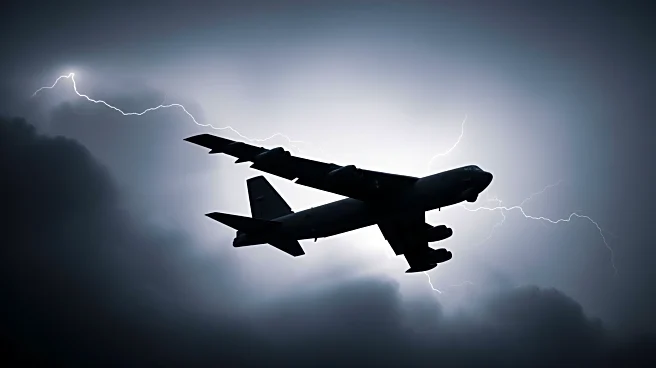What's Happening?
The United States has demonstrated a significant military presence near Venezuela by deploying three B-52 bombers to fly for hours over Caribbean waters. This action is part of a larger military buildup
in the region, involving approximately 10,000 U.S. troops. The deployment of B-52 bombers, known for their long-range capabilities and strategic importance, underscores the U.S. commitment to maintaining a strong military posture in the area. The move comes amid ongoing geopolitical tensions and is seen as a show of force intended to signal U.S. readiness to respond to any regional threats.
Why It's Important?
The deployment of B-52 bombers near Venezuela is a significant strategic maneuver by the United States, reflecting heightened military readiness in the region. This action could have implications for U.S.-Venezuela relations, potentially escalating tensions between the two nations. The presence of U.S. military forces in the Caribbean may also impact regional stability, influencing the actions of neighboring countries and international stakeholders. The show of force serves as a deterrent to potential adversaries and reinforces U.S. influence in the Western Hemisphere, which is crucial for maintaining geopolitical balance and protecting U.S. interests.
What's Next?
The continued presence of U.S. military forces in the Caribbean may lead to diplomatic responses from Venezuela and other regional actors. It is possible that Venezuela could seek support from allies or engage in diplomatic efforts to counter U.S. influence. Additionally, the U.S. may continue to monitor the situation closely, adjusting its military posture as necessary to address any emerging threats. The international community will likely watch these developments closely, as they could affect broader geopolitical dynamics in the region.
Beyond the Headlines
The deployment of B-52 bombers near Venezuela highlights the complex interplay of military strategy and international diplomacy. It raises questions about the ethical implications of military shows of force and their impact on civilian populations. Furthermore, this development may influence long-term U.S. foreign policy in Latin America, potentially shaping future military and diplomatic engagements in the region.









